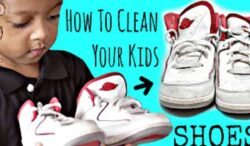To clean kids’ shoes, start by removing any dirt or debris and gently wiping the surface with a damp cloth. Then, mix a small amount of mild detergent with water and use a soft brush to scrub the shoes.
Rinse them thoroughly and let them air dry. Avoid using bleach or harsh chemicals, as they may damage the material.
Why Cleaning Kids Shoes Is Important
Keeping your kids’ shoes clean is not just about aesthetics. Regular cleaning and maintenance of their footwear have several crucial benefits. From ensuring hygiene and preventing the spread of germs to increasing the lifespan of the shoes and maintaining their appearance and functionality, cleaning kids’ shoes is an essential task for every parent.
Let’s delve into these reasons in more detail:
Ensuring Hygiene And Preventing The Spread Of Germs:
- Kids are naturally prone to playing in various environments, which exposes their shoes to dirt, mud, and other contaminants.
- Cleaning their shoes regularly helps eliminate harmful bacteria and allergens that may be present on the soles.
- Proper shoe hygiene reduces the chances of infections, foot odor, and other foot-related issues.
- It also minimizes the risk of spreading germs from one place to another.
Increasing The Lifespan Of The Shoes:
- Regular cleaning and maintenance of kids’ shoes can prolong their lifespan, saving you money in the long run.
- Removing dirt and debris prevents them from settling in the shoe material and causing unnecessary wear and tear.
- Treating stains promptly helps prevent permanent damage.
- Conditioning and proper storage can help maintain the shoe’s shape and prevent deterioration over time.
Maintaining The Appearance And Functionality:
- Kids’ shoes are exposed to various activities that lead to scuffs, stains, and general wear.
- Cleaning them regularly helps retain their original appearance and prevents them from looking worn out or shabby.
- Regular cleaning can also prevent the accumulation of dirt, which can affect the shoe’s functionality, such as compromising traction.
- By keeping their shoes clean, you ensure that they perform optimally and provide the necessary support and comfort for your child’s feet.
By cleaning your kids’ shoes regularly, you provide them with clean and hygienic footwear while lengthening the lifespan of their shoes. Furthermore, maintaining the appearance and functionality of their shoes ensures that they continue to look good and perform well.
Make it a habit to clean their shoes, and you’ll ensure not only their well-being but also the longevity of their favorite footwear.
Best Practices For Cleaning Kids Shoes
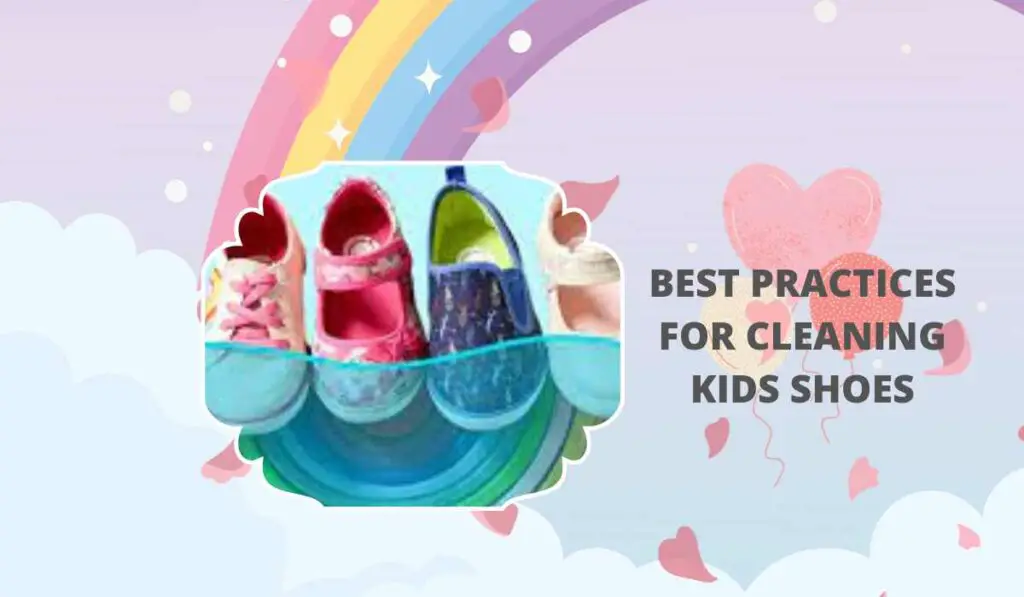
Kids can be messy, and their shoes often bear the brunt of their adventures. From muddy playgrounds to sticky spills, it’s essential to know the best practices for cleaning your little one’s shoes. By following these tips, you can keep their footwear looking fresh and extend their lifespan.
Choosing The Right Cleaning Method Based On The Shoe Material
Different shoe materials require specific cleaning techniques to ensure optimal results. Consider the following when selecting a cleaning method for your child’s shoes:
- Leather or synthetic leather: Use a gentle leather cleaner or a mixture of mild soap and water. Avoid excessive water use and make sure to dry the shoes properly.
- Canvas or fabric: Brush off any loose dirt or debris and then place them in a pillowcase or laundry bag. Wash them on a gentle cycle with a small amount of mild laundry detergent. Allow the shoes to air dry.
- Rubber or plastic: Wipe the shoes with a damp cloth or sponge soaked in warm, soapy water. For stubborn stains, use a mixture of baking soda and water or a magic eraser. Rinse and let them air dry.
Gathering Necessary Cleaning Supplies
Before you begin the cleaning process, make sure you have all the necessary supplies ready. Here’s what you’ll need:
- Soft-bristled brush or toothbrush: Ideal for removing dirt and grime from shoe surfaces.
- Mild soap or laundry detergent: Use a gentle soap suitable for the shoe material.
- Water: Required for dampening the cleaning cloth or sponge.
- Baking soda or magic erasers: Useful for tackling stubborn stains.
- Pillowcase or laundry bag: Helps protect delicate fabrics during machine washing.
- Towels or paper towels: For drying the shoes after cleaning.
Preparing The Shoes For Cleaning
Properly preparing the shoes before cleaning can make the process more effective. Follow these steps for optimal results:
- Remove any dirt or debris by gently brushing or wiping off the surface.
- If the shoes are wet, make sure to let them dry completely before cleaning.
- If there are any loose shoelaces or inserts, take them out to prevent damage during cleaning.
- Before applying any cleaning solution, test it on a small, inconspicuous area of the shoe to ensure it doesn’t cause any discoloration or damage.
- Follow the recommended cleaning method for the specific shoe material, using the appropriate supplies and techniques.
By following these best practices, you can maintain your child’s shoes in top condition, ensuring they not only look great but also last longer. So, don’t let dirt and stains get in the way of their adventures – keep those little shoes clean and ready for more fun!
Cleaning Sneakers And Canvas Shoes
Sneakers and canvas shoes are popular choices for kids due to their comfort and versatility. However, they can quickly accumulate dirt and stains from everyday wear and tear. Knowing how to clean them effectively will not only help maintain their appearance but also extend their lifespan.
Here are some essential tips to keep your kids’ sneakers and canvas shoes looking fresh and clean:
Removing Dirt And Debris:
- Start by removing any loose dirt or debris from the shoes. You can do this by gently tapping the shoes together or using a soft brush.
- For stubborn dirt, you can use a toothbrush or an old, soft-bristled brush to scrub the affected areas gently.
- Take extra care around the seams and crevices to ensure thorough cleaning.
Treating Stains Effectively:
- Different types of stains require different treatment methods. Here are some common stain types and how to deal with them:
- For mud or dirt stains, let the shoes dry completely and then brush off the dried dirt. Use a mild soap or detergent solution to dab on the stained area with a clean cloth. Rinse with water and allow the shoes to air dry.
- For grass stains, mix equal parts of white vinegar and water. Dab the mixture onto the stained area using a cloth or sponge. Rinse with water and air dry.
- For stubborn stains, such as ink or markers, use rubbing alcohol or nail polish remover applied with a cotton ball. Blot the stain gently, taking care not to rub it further into the fabric. Rinse with water and allow the shoes to dry completely.
Washing And Drying The Shoes Properly:
- Before tossing the shoes in the washing machine, check if they are machine washable. Most canvas shoes can be washed this way, but sneakers with leather or suede accents may require alternative cleaning methods.
- Remove the shoelaces and place them in a mesh bag or pillowcase to prevent tangling.
- Use a gentle cycle with cold water and a small amount of mild detergent. Avoid using bleach or harsh chemicals.
- Once the washing cycle is complete, remove the shoes and let them air dry naturally. Avoid exposing them to direct sunlight or using a dryer, as this can damage the fabric or cause shrinkage.
Remember that prevention is always better than cure when it comes to maintaining the cleanliness of your kids’ shoes. Encourage them to remove their shoes when playing in excessively muddy or dirty areas, and remind them to properly store and care for their footwear daily.
By following these cleaning tips and adopting good shoe maintenance habits, your children’s sneakers and canvas shoes will stay fresh and ready for their next adventure!
Cleaning Leather And Suede Shoes
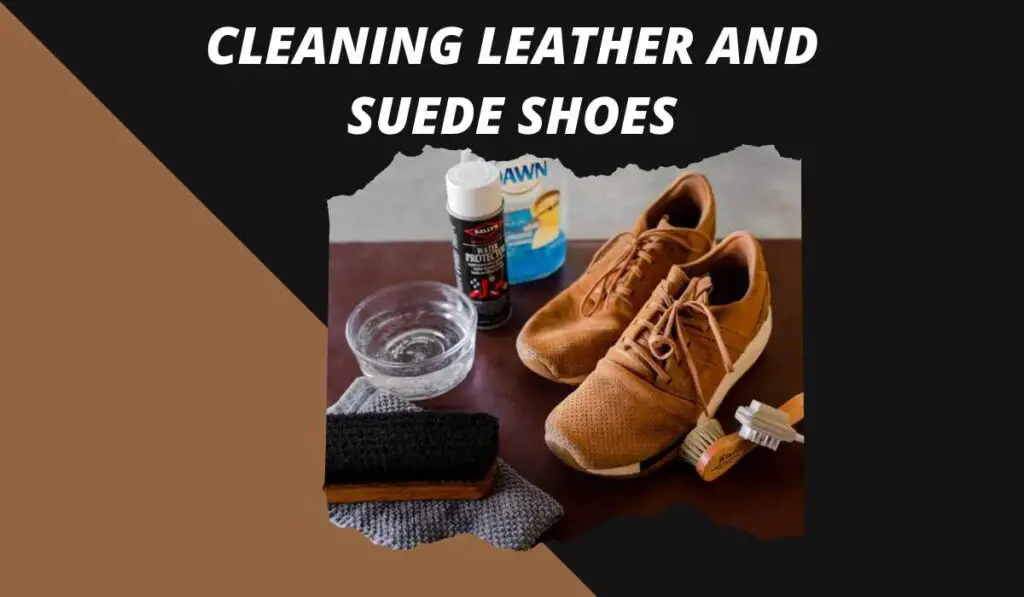
When it comes to cleaning leather and suede shoes, it’s important to take extra care to preserve their quality and appearance. Here are the key steps to effectively clean and maintain these types of shoes:
- Removing surface dirt with a soft brush: Before diving into the cleaning process, start by removing any loose dirt or debris from the shoes. Use a soft brush or cloth to gently brush away the surface dirt. This helps prevent the dirt from spreading and causing further damage during the cleaning process.
- Using appropriate cleaning products for leather and suede: Leather and suede shoes require different cleaning methods and products. Here’s a breakdown of what you need for each:
- For leather shoes:
- Leather cleaner: Look for a ph-balanced leather cleaner specifically designed for cleaning leather shoes. Avoid using harsh chemicals or household cleaners, as they can damage the leather.
- Sponge or soft cloth: Apply the leather cleaner onto a damp sponge or cloth, and then gently wipe the shoes in circular motions. This helps remove any stains or dirt from the surface of the leather.
- Leather conditioner: After cleaning, it’s important to restore moisture and suppleness to the leather. Apply a small amount of leather conditioner onto a clean cloth and rub it into the shoes, following the manufacturer’s instructions. This helps maintain the leather’s natural luster and prevents it from drying out.
- For suede shoes:
- Suede brush: To clean suede shoes, you’ll need a specialized suede brush with stiff bristles. Brush the suede in one direction to remove any dirt or stains. Avoid using excessive force to prevent damaging the delicate suede.
- Suede eraser: If there are any stubborn stains or marks on the suede, gently rub them with a suede eraser. This helps lift the stains without damaging the material.
- Suede protector spray: To protect the suede from future stains or moisture, consider applying a suede protector spray. This creates a protective barrier that repels liquids and prevents staining.
- Conditioning and protecting the shoes after cleaning: Once you’ve finished cleaning leather or suede shoes, it’s crucial to condition and protect them for long-lasting wear. Follow these steps:
- For leather shoes:
- Allow the shoes to air dry completely before applying any conditioner.
- Apply a small amount of leather conditioner onto a clean cloth and gently massage it into the leather. Make sure to cover the entire surface of the shoes.
- Let the shoes sit for a few minutes to absorb the conditioner, and then wipe off any excess with a clean cloth.
- Buff the shoes with a soft brush or cloth to restore their shine.
- For suede shoes:
- Allow the shoes to air dry naturally, away from direct heat or sunlight.
- Once the shoes are dry, use a suede brush to gently fluff up the nap and restore its texture.
- Spray a thin, even layer of suede protector spray onto the shoes, ensuring that you cover all areas.
- Allow the shoes to dry completely before wearing them again.
By following these steps, you can keep your kids’ leather and suede shoes looking clean, fresh, and in great condition. Remember to clean and protect these materials regularly to prolong their lifespan and maintain their stylish appearance.
Cleaning Rubber And Plastic Shoes
Rubber and plastic shoes are a popular choice for kids due to their durability and ease of cleaning. However, over time, these shoes can accumulate dirt, grime, and scuff marks, and lose their shine. To keep your child’s rubber and plastic shoes looking their best, here are some simple cleaning techniques to try:
Wiping Off Dirt And Grime:
To get rid of dirt and grime on rubber and plastic shoes, follow these steps:
- Start by removing any loose dirt or debris from the shoes using a soft brush or cloth.
- Mix a small amount of mild detergent or baby shampoo with warm water in a bowl.
- Dip a clean cloth or sponge into the soapy water and gently wipe the shoes, focusing on areas with stubborn stains or dirt.
- Rinse the shoes thoroughly with clean water to remove any soap residue.
- Use a dry cloth to pat the shoes dry and remove excess moisture.
- Allow the shoes to air dry completely before your child wears them again.
Removing Scuff Marks:
Scuff marks can make rubber and plastic shoes look worn and dirty. Here’s how to remove them effectively:
- Apply a small amount of toothpaste or baking soda to the scuff mark.
- Gently rub the toothpaste or baking soda onto the scuff mark using a clean cloth or soft brush.
- Continue rubbing in circular motions until the scuff mark is no longer visible.
- Wipe off any residue with a clean, damp cloth and allow the shoes to dry.
Restoring Shine And Luster To The Shoes:
Over time, rubber and plastic shoes can lose their shine and appear dull. Follow these steps to restore their luster:
- Apply a small amount of petroleum jelly or olive oil to a clean cloth.
- Gently rub the petroleum jelly or olive oil onto the shoes in a circular motion.
- Continue rubbing until the shoes start to shine and regain their natural luster.
- Wipe off any excess oil with a clean cloth.
- Allow the shoes to sit for a few minutes to absorb the oil before your child wears them.
With these simple cleaning techniques, you can keep your child’s rubber and plastic shoes looking clean, scuff-free, and shiny. Regular maintenance and cleaning will not only extend the lifespan of the shoes but also ensure that your little one’s feet are comfortable and well-protected.
Tools and Supplies Needed
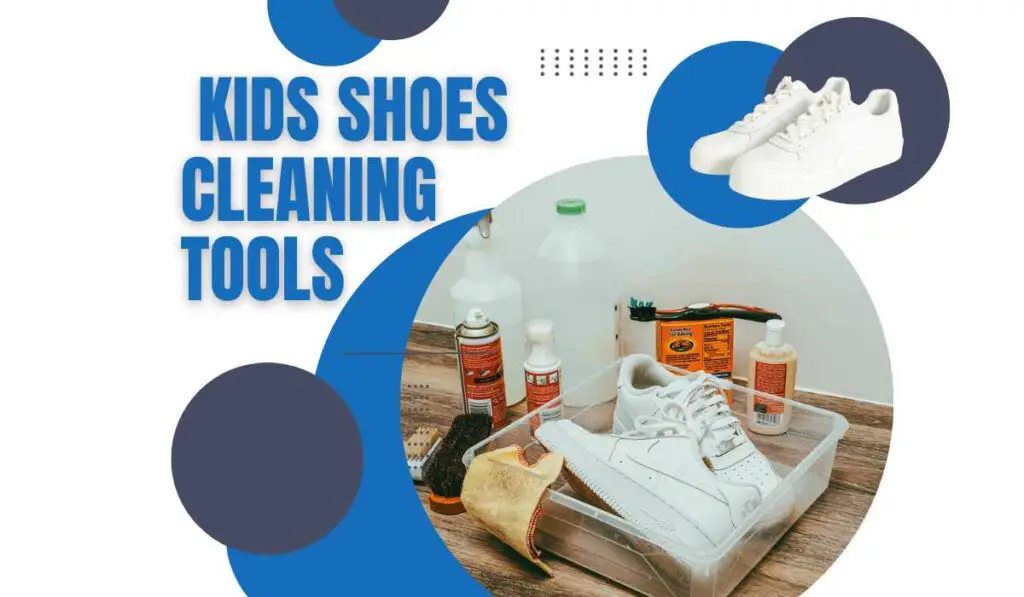
List of Essential Cleaning Supplies
Before you embark on cleaning your kids’ shoes, it’s essential to gather the right tools and supplies. Having the appropriate items at hand will make the process more efficient and help you achieve the best results.
- Soft Bristle Brush: A soft-bristle brush, such as a shoe brush or an old toothbrush, is invaluable for removing loose dirt and debris from the shoe’s surface. This step is crucial as it prevents scratching the material during cleaning.
- Mild Detergent or Cleaner: Depending on the shoe material, you may need a mild detergent or a specialized shoe cleaner. Leather, suede, and canvas may require different types of cleaning solutions. Always follow the manufacturer’s recommendations.
- Water: Clean, lukewarm water is a universal tool in shoe cleaning. It’s used for diluting detergents and for rinsing off cleaning agents. However, be cautious with water on sensitive materials like suede or nubuck.
- Cloth or Sponge: A clean, lint-free cloth or sponge is necessary for applying the cleaning solution and wiping away dirt and stains. For tougher stains or suede/nubuck, you may need specialized cleaning cloths.
- Shoelaces: If the shoes have removable laces, consider taking them off before cleaning. You can clean laces separately by soaking them in soapy water and then air-drying.
- Inserts or Insoles: If the shoe has removable insoles, take them out to clean separately. Insoles can absorb odors and moisture over time and benefit from occasional cleaning or replacement.
- Drying Materials: After cleaning, you’ll need materials for drying the shoes, such as newspaper or shoe trees. These help maintain the shoes’ shape and absorb excess moisture.
- Shoe Protector or Conditioner: For certain materials like leather, it’s a good idea to have a shoe protector or conditioner on hand. This can help maintain the material’s quality and appearance.
Safety Precautions
While cleaning kids’ shoes is a straightforward task, it’s essential to take some safety precautions to ensure both your safety and the shoes’ well-being.
- Ventilation: When using cleaning products, make sure you work in a well-ventilated area. Some cleaning agents may have strong fumes that can be harmful if inhaled in a confined space.
- Gloves: If you have sensitive skin or are using cleaning agents that could potentially irritate the skin, wearing gloves is a good idea to protect your hands.
- Protect the Surroundings: Lay down newspaper or a protective cloth beneath the area where you’re cleaning to catch any drips or spills. This prevents damage to your floors or surfaces.
- Follow Manufacturer’s Recommendations: Always follow the manufacturer’s care instructions for the specific type of shoe material you’re dealing with. Using the wrong cleaning product or method can lead to damage.
- Test in a Small Area: If you’re unsure about a cleaning product’s effect on the shoe material, test it in a small, inconspicuous area first to ensure it doesn’t cause any adverse reactions.
By having the right tools and supplies at your disposal and taking necessary safety precautions, you can confidently clean your kids’ shoes without the risk of damaging them or compromising your health. Proper preparation is key to achieving the best results and prolonging the life of your children’s footwear.
Dealing with Stubborn Stains
Common Types of Stains
Kids can be notorious for getting their shoes into all sorts of messes. To effectively tackle stains on their shoes, it’s essential to first identify the type of stain you’re dealing with. Common stains on kids’ shoes include:
- Mud and Dirt: These are perhaps the most frequent culprits. Mud and dirt stains are often easily visible, and they can leave a gritty residue on the shoes.
- Grass Stains: Active kids playing on grass may encounter greenish grass stains on their shoes. These can be stubborn to remove if not treated promptly.
- Food and Beverage Stains: Snack time or spills can result in stains from ketchup, juice, or other food and drink items.
- Ink and Marker Stains: Artistic endeavors can sometimes end up on shoes, leaving unsightly ink or marker stains.
- Oil or Grease Stains: These are common on shoes used for outdoor activities or cooking. They can be tricky to remove and may require specific techniques.
- Gum: Stepping on gum can be a sticky situation. Gum tends to adhere firmly to shoe soles and requires careful removal.
Stain Removal Techniques
Once you’ve identified the type of stain, you can employ the appropriate stain removal techniques. Here are some methods to consider:
- Using Household Items: Everyday household items can often work wonders in stain removal. For example, a mixture of baking soda and water can help lift out dirt and mud stains. Toothpaste, when applied gently and scrubbed with a soft cloth, can sometimes tackle scuff marks. For grass stains, a mixture of vinegar and water may be effective. Always test these methods in a hidden area first to ensure they won’t damage the shoe’s material.
- Commercial Stain Removers: Many commercial stain removers are designed specifically for various types of stains. When using a commercial product, follow the instructions carefully. Look for stain removers that are safe for the specific shoe material. For stubborn and unique stains, you may want to consult with a shoe-cleaning professional who can recommend the right product or technique.
It’s crucial to address stains as soon as possible to prevent them from setting in. The longer a stain sits on the shoe, the more challenging it can be to remove. Remember to be gentle when applying any cleaning agents, as aggressive scrubbing can harm the shoe’s surface. Always follow up with a thorough cleaning to remove any residue from the stain removal process. With the right techniques and a little patience, you can often make those stubborn stains on your kids’ shoes disappear, extending the life and appearance of their footwear.
Drying and Air Circulation
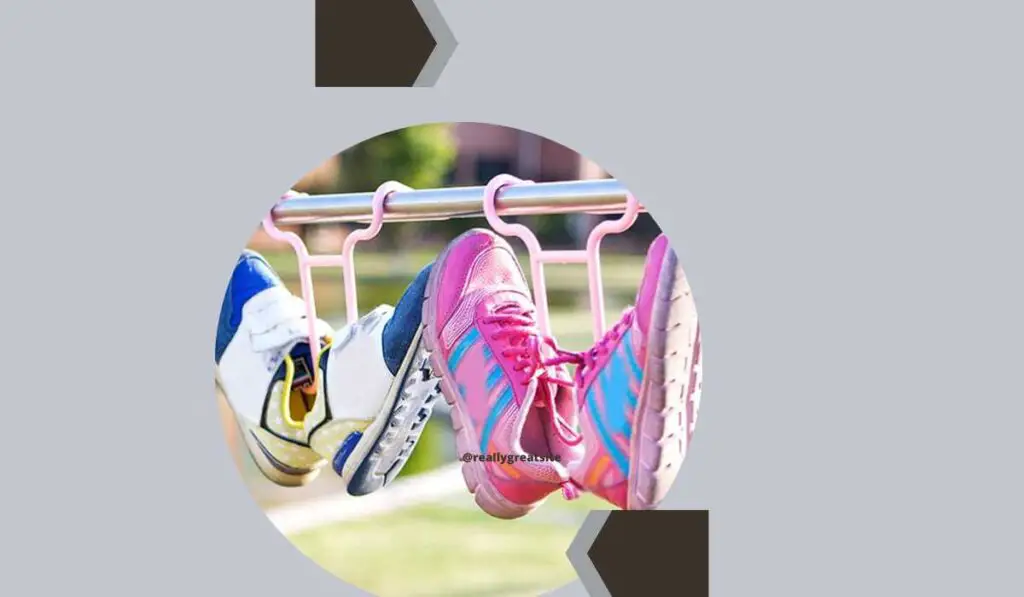
Proper Drying Techniques
Properly drying kids’ shoes after cleaning is essential to maintain their shape and prevent damage. Here are some effective drying techniques to consider:
After cleaning the shoes, remove any excess water or cleaning solution by gently patting them with a clean, dry cloth or paper towels. Avoid wringing or squeezing the shoes as this can misshape them.
For the inside of the shoes, remove the insoles and allow them to air dry separately. If the insoles are particularly wet or odorous, sprinkle baking soda inside them to help absorb moisture and neutralize odors.
To maintain the shape of the shoes, use shoe trees or stuff them with crumpled newspaper. This helps them retain their form as they dry and also absorbs moisture from the interior.
Avoid placing kids’ shoes in direct sunlight or near a direct heat source, such as a heater or radiator. High heat can damage the materials, causing them to crack or warp. Instead, place the shoes in a well-ventilated area at room temperature.
Allow the shoes to air dry naturally. This may take several hours or even overnight, depending on the shoe’s material and how wet they were during cleaning.
Preventing Mold and Mildew
Preventing mold and mildew growth in kids’ shoes is crucial for both hygiene and shoe longevity. Here are steps to keep these issues at bay:
Ensure the shoes are thoroughly dry before storing them. Even a small amount of moisture can promote mold and mildew growth.
Store shoes in a cool, dry place with good air circulation. Avoid placing them in airtight containers or plastic bags, as these can trap moisture and encourage mold growth.
Consider using moisture-absorbing products like silica gel packets or cedar shoe inserts. These can help control humidity inside the shoes and prevent mold development.
Regularly inspect stored shoes for any signs of mold or mildew. If you notice any, take immediate action to clean and disinfect the affected areas. A mixture of water and white vinegar can be used to clean and kill mold on the shoe’s surface. Make sure to dry them thoroughly afterward.
Allow shoes to breathe between wears. Avoid wearing the same pair of shoes every day, as this can lead to trapped moisture inside the shoes. Rotate between different pairs to give each one a chance to air out.
By following these proper drying techniques and taking preventive measures against mold and mildew, you can ensure that your kids’ shoes not only stay clean but also remain in good condition for a longer period. These practices promote both the hygiene and longevity of their footwear.
Tips For Cleaning Specialized Kids Shoes
Cleaning Light-Up Or Musical Shoes
Light-up or musical shoes are a favorite among many kids, but they can be a bit more challenging to clean compared to regular shoes. Here are some tips to keep them looking their best:
- Remove the batteries: Before starting the cleaning process, make sure to remove the batteries from the shoes to avoid any damage.
- Spot clean the surface: Use a damp cloth or sponge to gently scrub the surface of the shoes. Avoid submerging them in water or using harsh cleaning agents as these may damage the lights or sound mechanisms.
- Clean the soles: The soles of light-up or musical shoes can accumulate dirt and debris easily. Use an old toothbrush or a soft brush to scrub away any dirt, focusing on the grooves and crevices.
- Let them air dry: After cleaning, allow the shoes to air dry completely before putting the batteries back in. Avoid using a dryer or direct heat source as it may cause damage to the shoes.
Taking Care Of Sports Or Athletic Shoes
Sports or athletic shoes endure a lot of wear and tear, making regular cleaning essential for their longevity. Here are a few tips to help you keep them in great shape:
- Remove loose dirt: Start by tapping the shoes together to remove any loose dirt or debris. Use a soft brush or cloth to wipe away the remaining dirt.
- Hand wash if needed: If the shoes are not extremely dirty, a simple hand wash will suffice. Use a mild detergent mixed with warm water and gently scrub the shoes using a soft brush or cloth. Rinse thoroughly and let them air dry.
- Machine wash cautiously: For heavily soiled sports shoes, machine washing may be an option. However, use a gentle cycle and place the shoes in a mesh laundry bag to protect them from damage. Avoid using harsh detergents or bleach.
- Dry them properly: After washing, stuff the shoes with crumpled newspaper to help them retain their shape and absorb excess moisture. Allow them to air dry naturally, avoiding direct sunlight or heat sources such as a dryer.
Maintaining Waterproof Or Snow Boots
Waterproof or snow boots require specialized care to maintain their functionality and appearance. Follow these tips to clean and protect your kids’ waterproof footwear:
- Remove dirt and debris: Before cleaning, remove any dirt, mud, or snow from the boots by tapping them together or using a soft brush. This prevents further damage during the cleaning process.
- Spot clean the surface: To clean the exterior, use a damp cloth or sponge and mild soap to gently wipe away any stains or dirt. Avoid using strong chemicals as they may affect the waterproof coating.
- Rinse off salt residues: If the boots have been exposed to salt, it’s important to rinse off the residue promptly. Mix a solution of water and vinegar, and use a cloth to wipe the salt stains.
- Dry them properly: After cleaning, pat the boots dry with a clean towel and let them air dry naturally. Avoid using direct heat sources, as excessive heat can damage the boots’ materials. Apply a waterproofing spray if necessary to maintain the boots’ water resistance.
Remember, maintaining specialized kids’ shoes not only keeps them looking great but also ensures their longevity. By following these tips, you can keep your kids’ shoes clean, functional, and ready for their next adventure.
Preventing Shoe Odor And Bacteria Growth
Kids’ shoes can go through a lot of wear and tear, and it’s no secret that they can become smelly over time. To keep your little one’s shoes fresh and free from unpleasant odors, it’s important to take preventive measures against bacteria growth.
Here are some effective and easy ways to prevent shoe odor and the growth of bacteria:
Properly Airing Out The Shoes After Use
It’s crucial to allow your child’s shoes to air out after each use. This simple step can help prevent odor-causing bacteria from thriving in the shoes. Here’s how you can properly air out the shoes:
- Remove the insoles: Take out the insoles of the shoes to allow better airflow and ventilation.
- Untie the laces: Loosen or untie the laces to open up the shoe and improve air circulation.
Using Inserts Or Deodorizers
Another way to combat shoe odor is by using inserts or deodorizers. These can help absorb moisture and eliminate unpleasant smells. Consider the following options
- Odor-absorbing inserts: Use odor-absorbing inserts made from activated charcoal or baking soda to help control odors inside the shoes.
- Shoe deodorizers: Place sachets or shoe deodorizer balls inside the shoes to freshen them up between wears.
Regularly Cleaning Shoe Insoles
The insoles of kids’ shoes can become a breeding ground for bacteria and odor-causing germs. Regularly cleaning the insoles can be a great way to keep the shoes smelling fresh. Here’s how you can clean shoe insoles effectively:
- Remove the insoles: Take out the insoles from the shoes before cleaning.
- Hand wash or machine wash: Depending on the material, gently hand wash or machine wash the insoles using mild s
- Air dry thoroughly: Allow the insoles to air dry completely before placing them back in the shoes.
By following these preventive measures, you can ensure that your child’s shoes stay fresh, odor-free, and free from harmful bacteria. Encourage your little one to develop good shoe hygiene habits from an early age, and they’ll have comfortable and pleasant-smelling shoes to step into every time.
Storing And Organizing Clean Kids Shoes
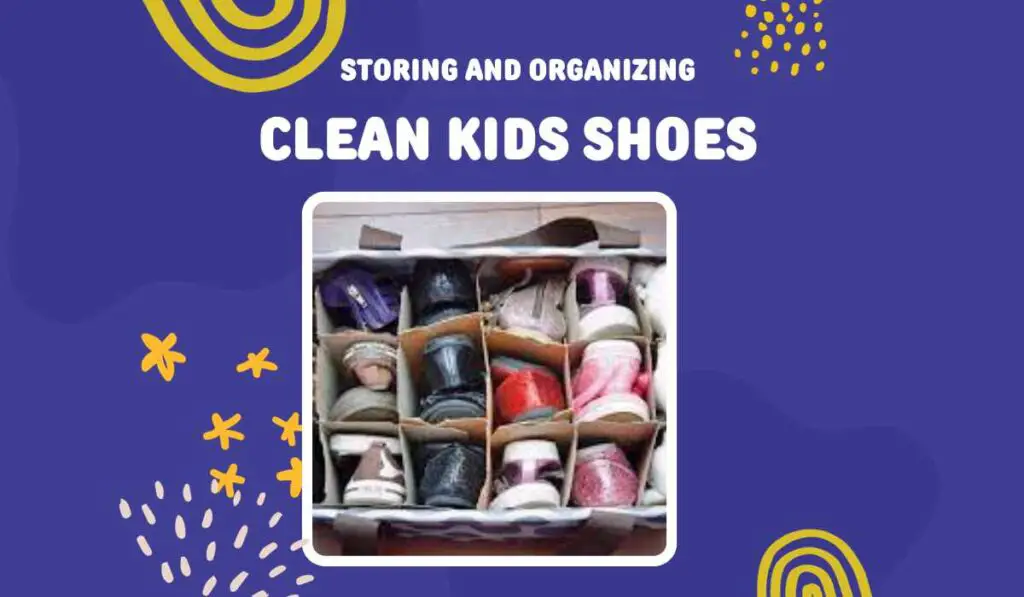
Keeping your kids’ shoes clean is one thing, but ensuring they stay organized is a whole different challenge. Say goodbye to misplaced pairs, messy shoe racks, and endless moments of frustration. With the right storage methods and organization strategies, you can keep your kids’ shoes in order while also promoting longevity.
Here’s how:
Choosing The Right Storage Method
When it comes to storing clean kids’ shoes, it’s important to consider the following options:
- Shoe racks: Invest in a sturdy and spacious shoe rack to neatly display your little one’s shoes. Opt for one with adjustable shelves to accommodate different shoe sizes.
- Cubbies or compartments: Utilize cubbies or compartmentalized storage containers to keep shoes separated and easily accessible. Label each section to encourage your child to put their shoes away in the right place.
- Hanging organizers: Make use of vertical space by hanging shoe organizers on the back of doors or inside closets. These handy organizers have pockets that can hold multiple pairs of shoes, maximizing storage capacity.
Keeping Pairs Together
It’s common to find a single shoe lying orphaned somewhere in the house. To prevent this, try the following strategies:
- Shoeboxes: Keep each pair of shoes in its original box or in designated shoeboxes. They not only protect the shoes from dust and damage but also make it easier to stack and organize.
- Clear containers: Consider transparent containers to store shoes, allowing you to quickly spot the pair you need without rummaging through a pile.
- Shoe shelves: Invest in shelves specifically designed to hold pairs of shoes. These shelves often have partitions or compartments, ensuring that each shoe has its place.
Rotating Shoes For Even Wear And Cleaning
Aside from ensuring cleanliness and organization, rotating your kids’ shoes is essential for even wear and tear. Here’s what you need to know:
- Pair rotation: Encourage your child to alternate between different pairs of shoes on a regular basis. This promotes even wear and prevents excessive strain on a single pair.
- Cleaning schedule: Establish a regular cleaning routine for your kids’ shoes. Designate certain days for cleaning and let your child assist you. This not only keeps the shoes dirt-free but also teaches your child responsibility and proper shoe care.
Remember, maintaining organized and clean kids’ shoes not only saves time but also saves money in the long run. By following these simple storage and organization tips, you’ll keep those little feet stepping forward in style and comfort.
When to Seek Professional Help
Signs Your Kid’s Shoes Need Professional Cleaning or Repair
While many routine shoe maintenance tasks can be done at home, there are times when it’s best to seek professional help. Here are some signs that your child’s shoes may require the expertise of a professional:
- Persistent Stains: If you’ve tried various cleaning methods, and stubborn stains or discoloration persist, it’s a clear indicator that the shoes need professional attention. Professionals have access to specialized cleaning agents and techniques that may effectively remove even the toughest stains.
- Visible Damage: Inspect the shoes for visible damage such as sole separation, torn fabric, or detached soles. These issues can affect the shoe’s structural integrity and comfort. Professional shoe repair experts can assess and mend these problems, ensuring the shoes are safe to wear.
- Unpleasant Odors: Lingering bad odors, despite your best efforts to deodorize the shoes, can indicate a deeper issue like bacterial growth within the shoe. Professional cleaning can effectively eliminate odors and improve overall shoe hygiene.
- Loss of Shape and Support: If your child’s shoes have lost their shape or are no longer providing proper support, it’s time to consult a professional. They can assess the shoe’s condition and, if necessary, restore its shape and functionality.
- Worn Outsoles: The condition of the shoe’s outsoles is crucial for stability and safety. If the outsoles are excessively worn, especially in specific areas, professional resoling or repair may be required to maintain traction and durability.
Finding a Reliable Shoe Repair Shop
When you’ve identified that your child’s shoes require professional attention, the next step is to find a reliable shoe repair shop. Here’s how to go about it:
- Ask for Recommendations: Seek recommendations from friends, family, or fellow parents. Personal experiences and word-of-mouth referrals can lead you to reputable shoe repair shops in your area.
- Check Online Reviews: Utilize online resources to research shoe repair shops near you. Websites like Yelp or Google Reviews often provide insights into the quality of service and customer satisfaction.
- Visit the Shop: Pay a visit to the prospective shoe repair shop in person. Assess the cleanliness of the establishment and the professionalism of the staff. Discuss the issues with your child’s shoes and ask about their experience in handling similar problems.
- Inquire About Services and Pricing: Get a clear understanding of the services offered and their pricing structure. Ask for an estimate for the specific repairs or cleaning needed for your child’s shoes.
- Check Credentials: Verify if the shop is properly licensed and has certified shoe repair professionals. This ensures that your child’s shoes are in capable hands.
- Turnaround Time: Inquire about the expected turnaround time for repairs or cleaning. This can be crucial if your child relies on the shoes for daily activities.
When you find a reputable and reliable shoe repair shop, you can entrust them with the care and maintenance of your child’s footwear. Addressing issues promptly and professionally can extend the life of the shoes, saving you money in the long run and ensuring your child’s comfort and safety.
Frequently Asked Questions For How To Clean Kids Shoes
How Often Should Kids Shoes Be Cleaned?
Kids shoes should be cleaned regularly, at least once every few weeks, or more frequently if they get particularly dirty. Regular cleaning helps to maintain the shoes’ quality, prevents odor buildup, and extends their lifespan.
What Is The Best Way To Clean Kids Shoes?
To clean kids’ shoes, start by removing any excess dirt or debris. Then, gently scrub the shoes using a mixture of mild soap and water. Rinse thoroughly, and allow the shoes to air dry. Avoid using harsh chemicals or abrasive materials that could damage the shoes.
Can I Wash Kids Shoes In The Washing Machine?
Not all kid’s shoes can be washed in the washing machine, so it’s important to check the manufacturer’s instructions. Some shoes, such as those made of delicate materials or with embellishments, may need to be hand-washed instead. Always follow the recommended cleaning method to avoid damaging the shoes.
How Can I Remove Stains From Kids Shoes?
To remove stains from kids’ shoes, try using a mild stain remover or a mixture of baking soda and water. Gently scrub the stained area with a soft brush or cloth, and then rinse thoroughly. Avoid using harsh chemicals that could discolor or damage the shoes.
How Do I Prevent Kids Shoes From Smelling Bad?
To prevent kids’ shoes from smelling bad, make sure to let them air out after each use. Use odor-absorbing insoles or sprinkle baking soda inside the shoes to absorb any odors. Additionally, you can regularly clean the shoes and socks, and avoid wearing them for extended periods without a break.
Conclusion
Cleaning kids’ shoes is essential for maintaining their hygiene and prolonging their lifespan. By following the simple steps outlined in this blog post, you can easily keep your children’s shoes looking fresh and clean. Start by removing any dirt or debris using a soft brush or cloth.
Then, use a gentle detergent or cleaning solution to wash away stains and odors. Remember to thoroughly rinse the shoes and allow them to air dry to prevent any damage. Regularly cleaning your kids’ shoes not only enhances their appearance but also reduces the risk of fungal or bacterial infections.
Additionally, it helps to instill a sense of cleanliness and responsibility in your children. So, make shoe cleaning a regular part of your household routine and ensure your kids step into the world with clean and healthy feet.

